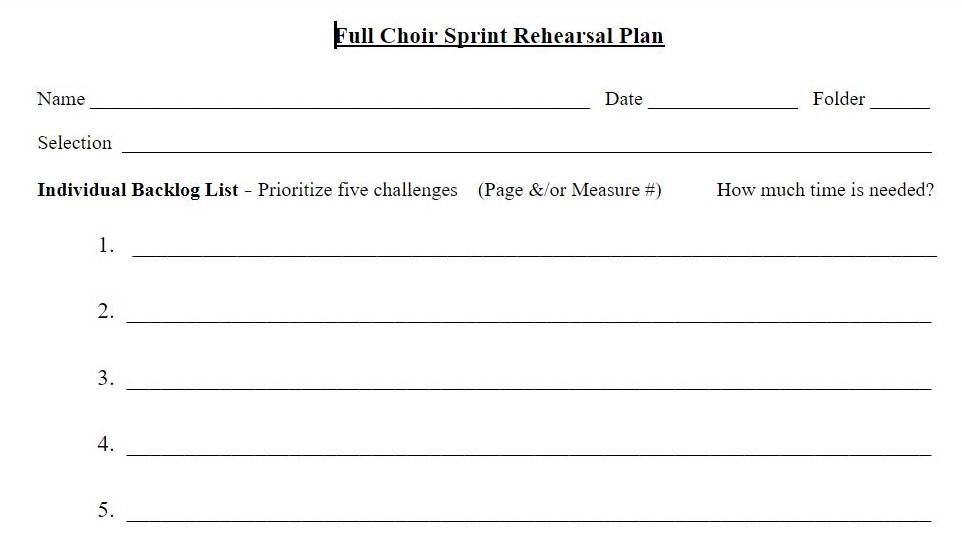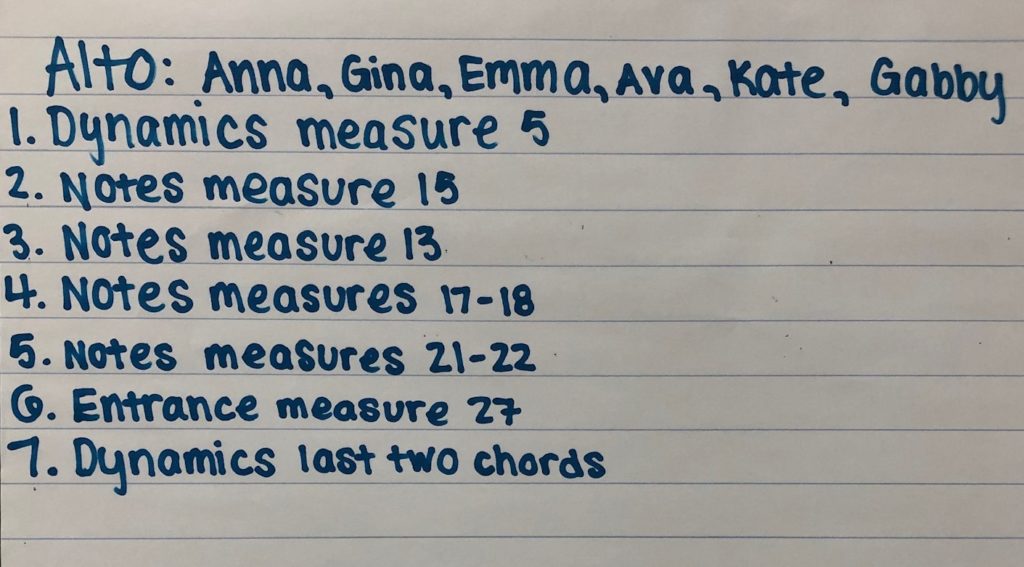I am now in my fourth week of Distance Learning and am finally getting a handle on teaching High School Music Theory and Choral Music online. It is challenging work, and at times it gets very frustrating, but also intriguing. The innovation and creativity I see at work with my colleagues, and the work of my students is remarkable.

How do I actively engage students in music learning and participation through Distance Learning?
As I search for teaching resources and research distance learning initiatives, I see our profession applying and adapting the traditional classroom choral music paradigm into the distance learning platform.
For me, to make sense of remote instruction, I am beginning with the distance learning platform. This starting point gives me the flexibility and creativity I need to develop and implement applicable online lessons and experiences for my students.
Agile Development Instructional Framework – Sprints
Through applying the Agile Development Instructional Framework (ADIF) for the past five years in the music classroom, my students developed the skills and abilities needed to work through sections of music together using what we call “Sprints.” A Sprint is a short rehearsal event (Iteration) that can last from three minutes to forty minutes or longer. Each Sprint focuses on one distinct skill or concept the students identify as essential to learning and performing a piece of music.
Below is an overview of the ADIF Sprint process and how students can actively participate in the learning process together, and then apply these skills towards independent learning. First, as a Choir, then as a Section, and finally as an Individual.
Full Choir Sprint Planning
Earlier this year, students learned the importance of essential rehearsal expectations, choral skills, and individual responsibility that formed the foundation for the coming year. For one activity, the choir listened to a new song and concentrated on specific areas that they felt would be challenging. The purpose? Their assignment was to create a lesson plan for our next rehearsal. At the beginning of our next class, I literally shuffled the papers, randomly selected one of their responses (no names mentioned), and off we went.

A lot of fun and very enlightening!
The choir as a group first realized that they could tell what section the anonymous lesson plan was from – many of the students’ responses were voice part specific. Through this activity, the choir recognizes that each section had different rehearsal needs. At the same time, students saw similarities and realized that they were also dependent on each other.
Sectional Sprint Planning
Next, the choir worked in their SATB sections. Each voice part collaborated and created a lesson plan for their Sprint Sectional. This plan is either called a Backlog list (non-prioritized list) or a Burndown Chart (A prioritized list).
After the Sectional Sprint Planning process, each section gives a brief presentation to the full choir outlining what they learned, and what they plan on working on during their Sectional Sprints.
Self-Sprint Planning
For the last step, students now work independently and take ownership and responsibility of their musicianship. This final step is where I find myself starting as I work with my students during the pandemic. Most of my effort and focus is on developing and expanding each choir member’s musicianship.
For our next concert, each choir will learn a song on their own. The catch is, we will not rehearse the song as a choir. The first time we will sing the song together as a choir, will be for our next concert. The ladies in the Women’s Choir are currently planning and practicing their parts for I See the Light from TANGLED. This assignment is on Flipgrid, and the audio clip below is from one of my sophomore sopranos. I am very proud of her.
Through Flipgrid, each choir member submitted a ninety-second video clip discussing what they are working on, and how they plan on learning the song (students didn’t have to be in the video – most showed the music as the spoke). The students enjoy this platform because they can see and hear their friends talk about music and get some tips on how others will practice the music.
The statistics for Flipgrids’ student engagement for the Women’s Choir is currently at 4.1 hours of viewing, with 148 views. My Concert Choir has 15.1 hours of viewing, with 655 views! To have some fun with my classes, the top three videos with the most hits gets the honorary distinction of “Ackles Top Video Picks of the week.”
Conclusion: ADIF Sprints
The underlying philosophy of ADIF is the desire to teach and enable each student to discover and to develop their ability to respond and think musically. It is the realization that each student has the inherent capacity to evaluate, plan, execute, and evaluate a musical experience in a way that is valuable to both the individual and the ensemble. It is the ability and capacity to learn with each other, for each other, and themselves.
Professional Reading
Check out Parker J. Palmers’ book, The Courage to Teach: Exploring the Inner Landscape of a Teacher’s Life. I am currently on Chapter five: Teaching in Community, A subject-centered Education. A most enjoyable read.
Leading Voices Next Online Meeting
Our next online meeting will be held on Monday, April 13, at 7:00 PM Eastern Standard Time, and will last for about a half an hour. If you are interested, you can email me at brianoackl or use the link below to join the meeting. Our next topic, Distance Learning, and the Experiential Learning Cycle.
https://meet.google.com/bsk-wfrg-dxv?hs=122
References:
Ackles, Brian O., 2018. Agile Development Instructional Framework (ADIF): A New Strategy for Student-Centered Music Education. Choral Journal, September 2018. Vol. 59, No. 2



Leave a Reply
You must be logged in to post a comment.